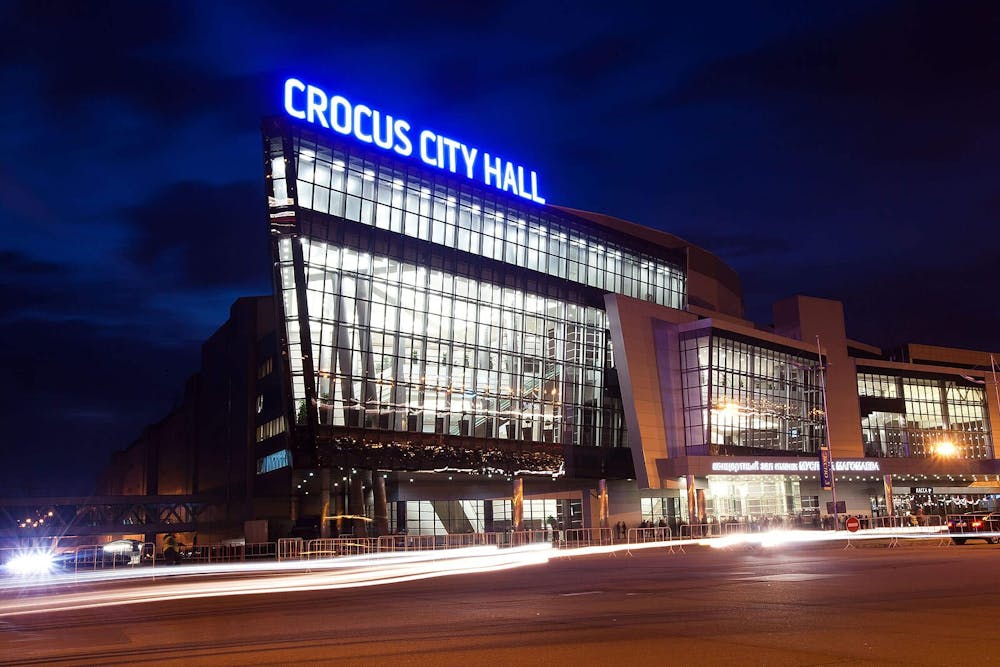By Gauri Patel
Staff Writer
A group of gunmen opened fire at a concert venue near Moscow, killing at least 60 people and injuring 145, on March 22. The assailants stormed into the Crocus City Hall with automatic weapons, explosives and incendiary devices, leaving the venue in flames with parts of its roof collapsed, according to The Associated Press.
The attack happened just before the Soviet-era rock band, Picnic, was about to perform to a full house of 6,200 people. Videos verified by Reuters captured the panic and chaos of the attack, showing people rushing to the exits of the hall as gunfire and screams echoed around them. Other footage shows the Crocus City Hall, home to both the music hall and a shopping center, on fire with clouds of smoke billowing into the air.
A survivor of the attack, Dave Primov, spoke to The Associated Press about what he witnessed. He described how the attackers were “shooting directly into the crowd” and detailed the chaos as people scrambled to leave the burning building.
“We all got up and tried to move toward the aisles. People began to panic, started to run and collided with each other,” Primov said. “Some fell down and others trampled on them.”
An affiliate of the ISIS militant group has claimed responsibility for the attack, according to the group's Amaq news agency. According to Reuters, the statement said the group’s fighters attacked a large gathering on the outskirts of Moscow, "killing and wounding hundreds and causing great destruction to the place before they withdrew to their bases safely." This claim was later verified by United States intelligence officials.
Russian media suggest that the gunmen fled the scene before authorities arrived, escaping in several vehicles. According to The Associated Press, nine people have been detained in Tajikistan over suspected links to the mass shooting, including four of whom were suspected to be directly involved in the attack. Those four suspects, identified as Tajik nationals, faced formal terrorism charges in a Moscow court and showed signs of severe beatings during the hearing. The remaining suspects have faced court and are being remanded in pre-trial detention.
Russian officials, along with Russian President Vladamir Putin, persistently attempt to link the assault to Ukraine, with whom Russia has been at war for over two years. Although no evidence has been presented, investigators claim the attackers had obtained cash and cryptocurrency from Ukraine and also took a man into custody who had supposedly been involved in the transfers of money. Putin has also claimed that the attackers fled to Ukraine following the attack, according to The Associated Press.
“Ukraine has never resorted to the use of terrorist methods,” Mykhailo Podolyak, an adviser to Ukrainian President Volodymyr Zelenskyy, posted on X. “Everything in this war will be decided only on the battlefield.” He added that Moscow is using the accusation as a pretext to escalate its military operations in Ukraine.
The assault in Moscow came two weeks after the U.S. warned Russia of a potential attack targeting large gatherings in the capital under the intelligence community's “duty to warn” rule that obliges officials to share knowledge of a threat, even with adversaries. The U.S. Embassy in Moscow issued a public notice on March 7, advising Americans to avoid large gatherings for the next 48 hours, including concert venues, due to the potential for a terrorist attack.
According to NPR, three days before the attack, Putin dismissed the warnings as propaganda designed to scare Russian citizens, saying the warnings “[resemble] outright blackmail and an intention to intimidate and destabilize our society."
Rescue teams are still working to locate victims under the rubble, as up to 100 victims have been reported as missing, and the damaged concert hall has been partially dismantled to aid in the search effort.







